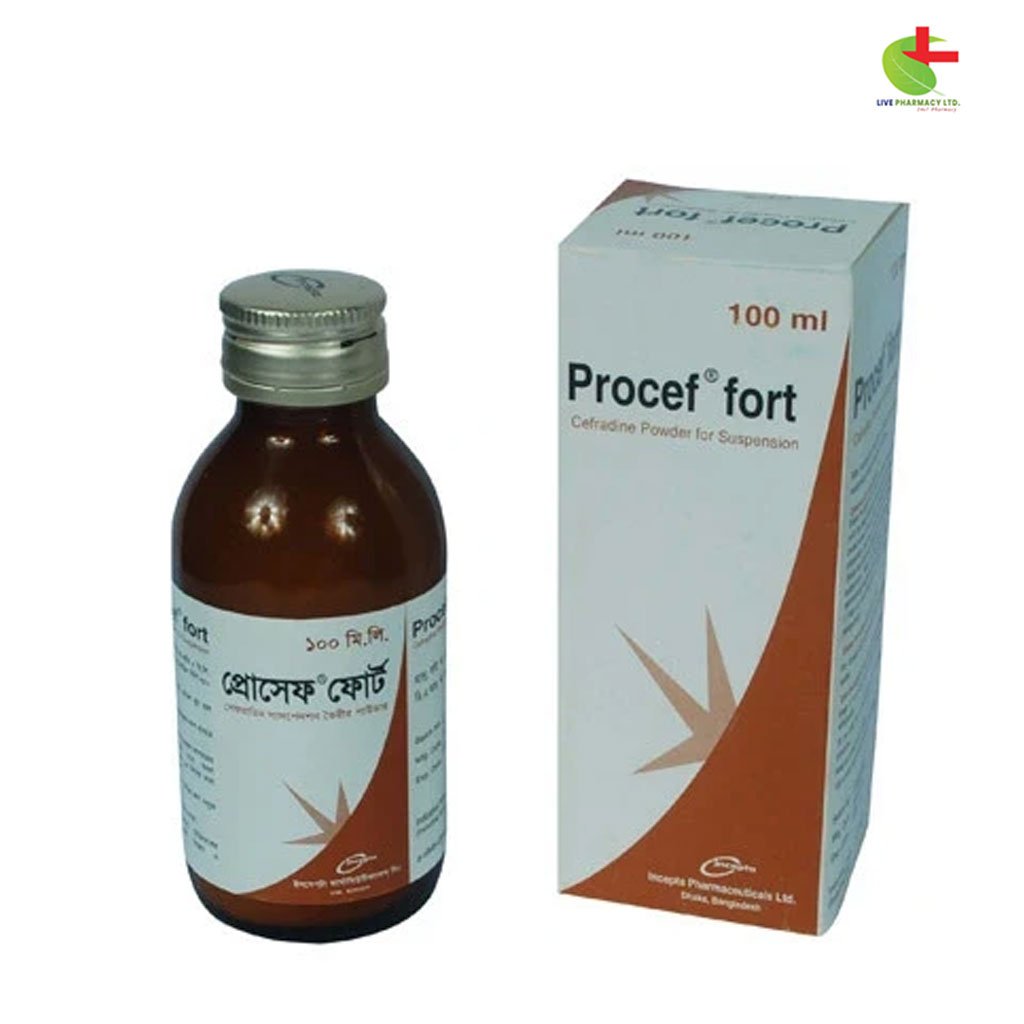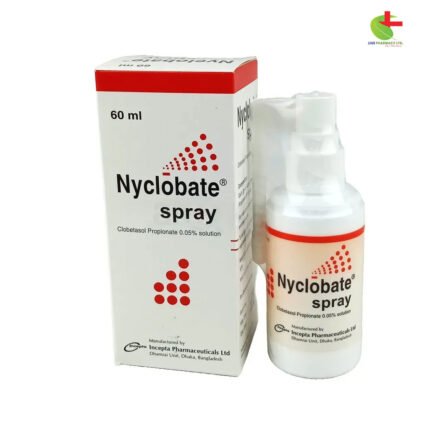Procef Fort
250.00৳ Bottle (100ml)
- Procef Fort is a broad-spectrum cephalosporin antibiotic used to treat infections caused by both Gram-positive and Gram-negative bacteria.
- It is effective for respiratory, urinary tract, and skin infections, as well as for preventing infections in surgical procedures.
- It is available in oral and injectable forms and should be used according to the doctor’s prescription.
- Procef Fort may cause side effects like gastrointestinal disturbances and should be used with caution in patients with penicillin allergies.
 Brand
Brand
|
Incepta Pharmaceuticals Ltd |
|---|---|
 Generics
Generics
|
Cephradine |
 Type
Type
|
Powder for Suspension |
Indications
Procef Fort is prescribed for the treatment of infections caused by susceptible Gram-positive and Gram-negative bacteria. These include:
- Upper Respiratory Tract Infections: such as sinusitis, pharyngitis, tonsillitis, laryngotracheobronchitis, otitis media.
- Lower Respiratory Tract Infections: including bronchitis (acute and chronic), lobar pneumonia, and bronchopneumonia.
- Urinary Tract Infections: including cystitis, urethritis, and pyelonephritis.
- Skin and Soft Tissue Infections: such as abscesses, cellulitis, furunculosis, and impetigo.
Procef Fort has in vitro efficacy against the following microorganisms:
- Gram-positive: Staphylococci (including penicillin-sensitive and resistant strains, penicillinase-producing species), Streptococci, Streptococcus pyogenes (beta-hemolytic), Streptococcus pneumoniae.
- Gram-negative: Escherichia coli, Klebsiella spp., Proteus mirabilis, Haemophilus influenzae, Shigella spp., Salmonella spp. (including Salmonella typhi), Neisseria spp.
Notably, many strains of E. coli and Staphylococcus aureus that produce penicillinase (and are resistant to ampicillin) are still susceptible to Procef Fort, as it is unaffected by this enzyme.
Pharmacology
Cephradine, the active ingredient in Procef Fort, is a semisynthetic, broad-spectrum, bactericidal antibiotic. It is effective against both Gram-positive and Gram-negative bacteria. Cephradine acts by inhibiting bacterial cell wall synthesis. It prevents the cross-linking of peptidoglycan in the bacterial cell wall, leading to the formation of pores and the eventual lysis of the bacteria due to osmotic pressure.
Dosage & Administration
For Oral Administration:
Adults:
- Urinary Tract Infections: 500 mg four times daily or 1 g twice daily. Higher doses may be needed for severe or chronic infections, and extended treatment is necessary for complications like prostatitis or epididymitis.
- Respiratory Tract Infections: 250-500 mg four times daily or 500 mg-1 g twice daily, depending on the infection’s severity and location.
- Skin and Soft Tissue Infections: 250-500 mg four times daily or 500 mg-1 g twice daily, based on the infection’s severity and location.
Children:
- The recommended daily dose is 25 to 50 mg/kg, divided into two or four doses.
- Otitis Media: 75-100 mg/kg daily, divided every 6 to 12 hours.
- Maximum Daily Dose: 4 g.
Elderly:
- Standard adult doses are usually appropriate, but careful monitoring is recommended for patients with impaired renal or hepatic function.
For Injectable Administration:
Adults:
- The usual dose is 2-4 g daily in four equally divided doses, up to 8 g daily. A single preoperative dose of 1-2 g may be administered for prophylaxis.
Children:
- The recommended dose is 50-100 mg/kg daily, divided into four doses, with up to 300 mg/kg daily for severe infections.
Interactions
The combination of Cephradine with nephrotoxic drugs (e.g., aminoglycosides) may increase the risk of kidney damage. Diuretics (e.g., furosemide) and probenecid may enhance renal toxicity.
Contraindications
Procef Fort should not be used in individuals with known hypersensitivity to cephalosporins.
Side Effects
The most common side effects are gastrointestinal disturbances and hypersensitivity reactions. In rare cases, patients may experience:
- Skin rashes, joint pain, edema, or urticaria.
- Blood disorders like thrombocytopenia, leucopenia, or anaemia.
- Symptoms like dizziness, confusion, and sleep disturbances.
- Hepatic issues like transient hepatitis and jaundice.
- Renal disorders like reversible interstitial nephritis.
Pregnancy & Lactation
Cephradine has not shown teratogenic effects in animal studies, but its safety during pregnancy is not fully established. Cephradine is excreted in breast milk and should be used cautiously in nursing mothers. Patients should be advised not to operate heavy machinery or drive if they experience dizziness.
Precautions & Warnings
- Long-term use may result in superinfections due to resistant organisms.
- Patients allergic to penicillins should use Procef Fort with caution due to possible cross-sensitivity with beta-lactam antibiotics.
- Cephradine may cause a false positive in urine glucose testing, but enzyme-based tests are not affected.
- Dosage adjustment is required in patients with renal impairment.
Special Populations
Renal Impairment: Dose adjustments based on creatinine clearance:
- CrCl >20 ml/min: 500 mg every 6 hours.
- CrCl 5-20 ml/min: 250 mg every 6 hours.
- CrCl <5 ml/min: 250 mg every 50-70 hours.
For patients on haemodialysis:
- 250 mg at the start and every 6-12 hours post-dialysis, as required.
Overdose Effects
Symptoms of overdose include nausea, vomiting, diarrhea, and stomach upset. Treatment is supportive, with gastric lavage if a large quantity is ingested.
Therapeutic Class
First-generation Cephalosporins
Storage Conditions
Procef Fort Suspension should be freshly prepared. Reconstituted suspension must be used within 7 days if stored at room temperature, or within 14 days if refrigerated. Injection solutions should be used within 2 hours at room temperature, or stored at 5°C for up to 12 hours.
Keep Out of Reach of Children. To be dispensed only on the prescription of a registered physician.













Reviews
There are no reviews yet.